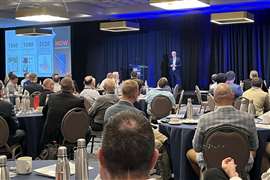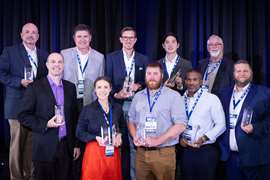Key takeaways from Power Progress Summit 2024
22 October 2024
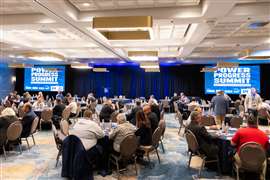 Photo: Eason Photography
Photo: Eason Photography
Speakers at the 6th annual event found common ground in addressing the overall theme of digitalization and decarbonization.
The overarching theme of the 2024 Power Progress Summit, held in Chicago, Ill., on Oct. 1-2, was “Developments in Digitalization & Decarbonization.” While the many speakers who represented a cross section of industry shared their thoughts with an international crowd of attendees, a few common topics emerged over the course of the event.
Flexibility in Power
One subject that repeated itself in several presentations was the need for flexibility in power solutions, both to decarbonize and meet a broad range of customer requirements.
Kelvin Bennett, senior vice president of engineering for AGCO, was tasked with answering this question specifically in his presentation about how engine suppliers were solving customer challenges throughout the energy transition. Noting that AGCO’s mission is to “feed the world,” Bennett said the company is working to help its customers do that by providing a “wider spectrum of power.”
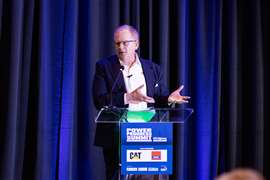 AGCO’s Kelvin Bennett speaks at PPS 2024 on how engine suppliers are solving customer challenges in the energy transition. (Photo: Eason Photography)
AGCO’s Kelvin Bennett speaks at PPS 2024 on how engine suppliers are solving customer challenges in the energy transition. (Photo: Eason Photography)
“That’s what our internal messaging is, and our external,” he said. “We just said, ’80 years of great diesel engines.’ Well, what’s the next 80 years? I think there are still internal combustion engines for most, if not all, of that for sure. But you have to go wider.”
By that, Bennett explained that means renewable fuels, hybrid technology, battery electric (BE) power and hydrogen fuel cell solutions.
“So, we’re casting a wide net, but maybe what we’re not doing is going very far from the boat,” he said, referring to AGCO’s goal of staying true to the agricultural markets that are central to its business.
Earlier in the program, Brad Sutton, executive director of powertrain engineering for Cummins, gave a keynote address on data and AI in optimizing power systems. He said that data and AI analysis have made it easier for manufacturers to understand the needs of the fleets they serve to provide them with the power solutions they need.
“With these tools, can we optimize their fleet in terms of power, whether it’s diesel, gasoline, hydrogen, natural gas, renewable natural gas and even whether it’s new power?” Sutton said. “Maybe battery electric makes a lot of sense for that customer because they return home every night, and they have the infrastructure to do it.”
Sutton added that Cummins is not waiting for one decarbonization technology to rise above the others. Instead, it is investing in a variety of solutions to reduce carbon dioxide (CO2), from new internal combustion solutions using different fuel types to BE and hydrogen fuel cell technology.
On Day 2 of the summit, Alex Woodrow, managing director of business consultancy Knibb Gormezano Partners, addressed a session of Off-Highway Research’s Off-Highway Conference, which was incorporated into the 2024 Power Progress Summit. In discussing fuel diversification in decarbonization, Woodrow said many solutions would be required.
“We’re going to need everything,” he said. “We’re going to need battery electric. We’re going to need alternative fuels, whether that is hydrogen, ethanol, methanol. We’re going to have fuel cells. We’re going to have all these different solutions.”
In talking about the global marketplace for off-highway power solutions, Woodrow added that these solutions will need to be applied to the millions of off-highway vehicles being produced every year around the world.
“In total, we’ve got around five million units in the segments that we’re looking at,” he said. “All of these, again, have to be decarbonized or go to different solutions at some time.”
Optimized TCO
Given the escalating costs of the technologies required to address decarbonization, another summit takeaway was the importance of optimizing total cost of ownership (TCO).
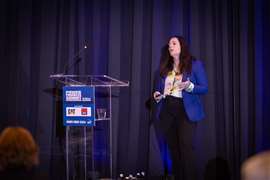 Tara Stryker, vice president for auction company RB Global, said that TCO in the North American used equipment market will continue to outpace inflation in the near future. (Photo: Eason Photography)
Tara Stryker, vice president for auction company RB Global, said that TCO in the North American used equipment market will continue to outpace inflation in the near future. (Photo: Eason Photography)
“Everybody is looking to a decarbonized future or a zero emission future,” said Alexandre Esgolmin, head of driveline technology, North America, for ZF Group. In his Day 1 presentation on machine electrification, he said that decarbonization “needs to be done in a way that makes the TCO affordable and sustainable for the industry and for the end customer. It cannot be just something that’s pushed to the end customers to make it work.”
Sutton also touched on TCO in his keynote session. “Reduced TCO — that’s a huge topic. I think a big worry from our industry is, as this new technology comes, it becomes very expensive. How are we all going to be able to afford this? Where’s the payback?”
Addressing the North American used equipment market during the Off-Highway Conference, Tara Stryker, vice president for auction company RB Global, said that TCO will continue to outpace inflation in the near future.
“We’ve seen new equipment costs rising more than 30 percent in the last four years,” she said. “If you go back the 12 years prior to COVID, that’s more than double the increase that we saw back then.”
Industry Collaboration Required
Finally, many summit presenters noted that addressing the challenges of decarbonization — developing the new technologies and implementing the right regulatory frameworks — will require collaboration across the industry.
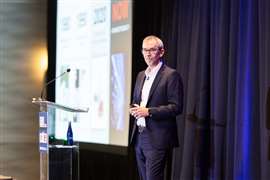 “We have to break down those walls in the industry and start to collaborate,” said Brad Sutton, Cummins’ executive director of powertrain engineering, at PPS 2024. (Photo: Eason Photography)
“We have to break down those walls in the industry and start to collaborate,” said Brad Sutton, Cummins’ executive director of powertrain engineering, at PPS 2024. (Photo: Eason Photography)
Sutton said innovations in AI in the development of power systems cannot be accomplished alone and requires industry collaboration.
“Using AI to help us get there faster is right here, right now, but we have to break down those walls in the industry and start to collaborate, share information, share best practices, share what doesn’t work, share what does work, and try to help each other get there,” he said.
According to Oliver Lythgoe, chief marketing officer for The Fetis Group, software innovation is an area in which collaboration is sorely needed.
“There will be a lot of software in the future,” he said. “Let’s have a look at how the automotive OEMs have done so. In a modern car, there can be more than 200 million lines of code. And one of them — take the biggest car OEMs who have hundreds, even thousands of software engineers — they still do not write their own code. They still only write 10, 15, 20 or 30 percent of their code. The rest is through collaborative means.”
Alan Berger, managing partner for business consultancy ABCG, expressed his admiration for equipment dealers in his presentation to the Off-Highway Conference.
“Absolute respect for what the dealers do in this industry,” he said. “They kind of clean up the screw-ups from the product development guys and keep things moving. So, they’re important. But they’re not going to just follow you because you think they should. You need to engage them and make sure that they actually are able to follow you. [There are] lots of ways you can work together with them to do that.”
STAY CONNECTED



Receive the information you need when you need it through our world-leading magazines, newsletters and daily briefings.
CONNECT WITH THE TEAM








